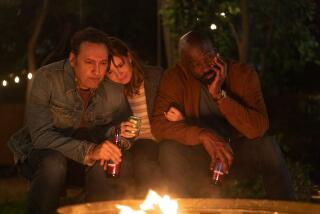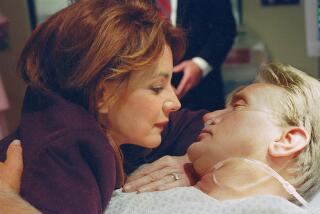âBreaking Badâ recap: Long-buried bombs explode
Alfred Hitchcock famously said that the difference between suspense and surprise hinges on audience foreknowledge. Picture two people eating. Now imagine a bomb underneath the table, about to go off. Suspense requires the audience to know the bomb is there, to live in terrible anticipation that it will go off and explode two characters weâve hopefully come to know and like. Surprise is what happens when the audience doesnât know, and the bomb just goes off. Both methods can work, but in my experience, suspense is generally preferable to surprise. When anything can be a surprise, it tends to breed mistrust in the audience, and mistrust is the biggest enemy possible of good storytelling.
âBreaking Badâ is nothing if not expert at planting bombs under tables, then showing the audience seven or eight times that the bomb is there. Whatâs great about the show is that even as it builds up all that suspense, it then often finds surprising ways for the bomb to go off.
Take, for instance, the case of Jesse Pinkman, whom the audience first sees in âBuriedâ lying on his back on a merry-go-round in some Albuquerque park. Heâs been discovered by an old man who left his house and found a bundle of money lying on the ground in front of it, before discovering more bundles of money on the ground in front of his neighborsâ houses. He follows the trail of Benjamin Franklin-adorned breadcrumbs down to the park, where he finds Jesse, the groans of the merry-go-round suggesting all the pain the young man feels deep down.
WATCH: Video chat with âBreaking Badâsâ Aaron Paul
And thatâs where we leave Jesse. For the whole episode until its very end.
The rest of the episode is solid stuff, the show putting various pieces in place and setting plans in motion for the big endgame, but itâs unquestionably enhanced by the question of just what might happen to Jesse. Every time his name is mentioned, itâs a reminder that heâs out there, the one loose end that Walt has yet to bother tying up, the one fray in the tapestry that might allow everything to unravel (as we know it will). Leaving that question hanging doesnât directly motivate Walt or Skyler or anyone, really, but it does contribute to the audienceâs growing sense of unease, the sense that all of this is going to start crumbling around Waltâs ears sooner, rather than later.
Itâs perhaps a bad idea to spend so much time on Jesse in a review of âBuriedâ â he doesnât have a single line of dialogue, either at the playground or when heâs being interrogated at episodeâs end â but the way the show uses him is a microcosm of the way itâs used Skyler all along. Ever since she discovered Waltâs big secret in the season 3 premiere, the question has been if she would tip her hand to her sister and brother-in-law. Even as recently as season 4, such a thing has seemed all but inevitable. Yet as the showâs writers have kept frantically spinning plates to keep Skyler under the same roof as her emotionally abusive husband (even when she briefly escaped in season 4), theyâve landed upon the Carmela Soprano answer: Like it or not, Skyler White is now complicit in her husbandâs actions.
The idea is elegant in its simplicity. But not only does it solve one of the showâs major plot problems, but it provides the moral and emotional underpinnings for âBuried,â which is gutting as the audience watches Skyler realize just what Hank knows, then wrestle with what â if anything â to tell him about what she knows of her husbandâs activities. Skylerâs always been a pragmatic woman. Indeed, Vince Gilligan has described her as the most pragmatic character on the show several times. Itâs obvious when she meets with Hank at the diner, where he pushes too far, too fast, in trying to get a confession on his recorder, that thereâs a huge part of her that would love to give her husband up, to end this whole charade and return to whatever she can salvage of her old life.
PHOTOS: On the lot with âBreaking Badâ
Yet to do that is to lose everything. The money and the car wash and the stability. Walt might have become a monster. He might have become something she hated, deep down. But there are other aspects to her new life that she obviously enjoys. Her clothes are nicer, and she drives a better car. Sheâs becoming adapted to her new habitat, and even worse, she should go to jail for laundering that money, for knowing about her husbandâs actions and telling no one, for so many things. Sheâs trapped, as buried as the money Walter sticks beneath the desert sands.
The White-Schrader family axis has been âBreaking Badâsâ one constant, even from its earliest days, when it was a much smaller-scale domestic drama than the pulp extravaganza itâs become. And if youâve ever wondered precisely why Gilligan and his cohorts would pause the action to spend time at another family dinner or family barbecue, well, âBuriedâ provides your answer. The moment Marie slaps Skyler feels seismic, as does the awful, horrifying fight over baby Holly, whom Marie tries to take with her after learning all that Walt has done and realizing her sisterâs complicity. Yet it also provides Skyler with the answer she thinks she needs: Hank doesnât know anything. If she and Walt can just lay low for a while, then this might all blow over.
Until Jesse Pinkman re-enters the story and the bomb goes off.
âBreaking Badâ has always occupied a moral universe, a place where some sort of moral force tugs at strings behind the scenes to make sure the good are rewarded and the wicked punished â eventually. Yes, so much of Hankâs investigation is driven by evidence that simply falls into his lap, but in almost every case, that evidence lands in his lap because he makes a difficult but moral choice somewhere else in his life. Think, for instance, of how he accepts the punishment for beating up Jesse in season 3âs âOne Minute,â only to see that repaid by the universe in his survival of the shootout with the Cousins.
Here, he realizes with Marieâs help that he needs to go in and tell his colleagues what he suspects, the better to get them on the case and bring down Walt. It will end his career, almost certainly, not just because he never realized this, so blinded was he by his affection for and underestimation of Walt, but also presumably because his recovery from that shootout was funded by drug money, even if he didnât know it at the time. Yet itâs the right thing to do, and Hank always does the right thing. And right before heâs about to call the conference to talk it over with the others, he finds out that his âold friendâ Jesse Pinkman is in custody, having turned up with millions of dollars in cash in a park. Once again, heâs rewarded indirectly.
PHOTOS: Dysfunctional TV families
âBuriedâ has problems here and there. Waltâs ability to dig a hole in the desert large enough to bury all of that money strains credulity when heâs on chemotherapy, though I appreciated the hat tips to âFargoâ and having him collapse from the strain eventually. (His offer to turn himself in was also the most human heâs been in ages.) And the scenes with Lydia and Todd still seem dropped in from another, lesser show entirely. I dearly hope theyâre leading somewhere other than just marking time.
Yet any qualms I might have are easily wiped away by the sound of that merry-go-round over the closing credits, groaning and moaning away. Bombs are about to go off all over Albuquerque, and who knows who will be caught in the shrapnel?
ALSO:
Who was Sundayâs âBreaking Badâ dedicated to?
Aaron Paul got teary-eyed over final âBreaking Badâ script
âBreaking Badâ recap: Walterâs new, old disguise
--Todd VanDerWerff
https://twitter.com/tvoti
More to Read
The complete guide to home viewing
Get Screen Gab for everything about the TV shows and streaming movies everyoneâs talking about.
You may occasionally receive promotional content from the Los Angeles Times.






